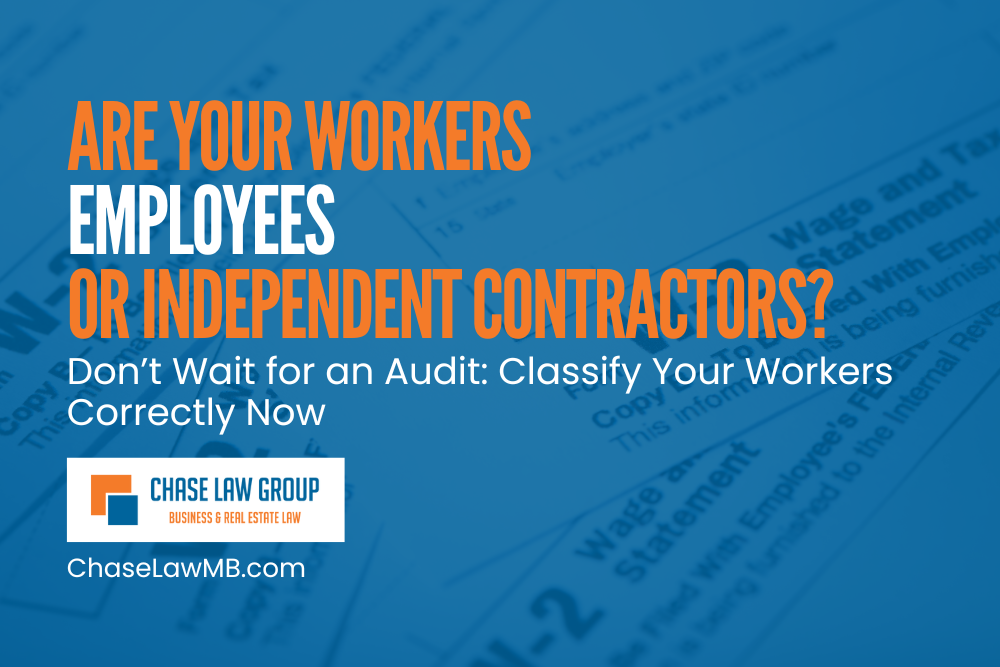Are Your Workers Employees or Independent Contractors?
By Admin March 25, 2025 Category: Employment Tags: AB5 compliance business attorney Business Compliance business law California Labor Law chase law group chase law manhattan beach deann chase employee misclassification employment attorney employment law hr compliance independent contractor legal risk prevention los angeles business attorney small business law small business support wage and hour law Worker classification

Classifying your workers correctly has never been more important—or more challenging. In California, the distinction between independent contractors and employees continues to evolve, and misclassification can lead to serious legal and financial consequences, including penalties, back pay, and tax liabilities.
As we move into 2025, it’s essential for business owners to understand how worker classification is determined and what has changed in the law.
Understanding the ABC Test
Under California’s AB 5, most workers are presumed to be employees unless the hiring business can satisfy all three parts of the ABC test:
A. The worker is free from the control and direction of the hiring entity in connection with the performance of the work.
B. The worker performs work that is outside the usual course of the hiring entity’s business.
C. The worker is customarily engaged in an independently established trade, occupation, or business of the same nature as the work performed.
If the business cannot meet all three criteria, the worker must be classified as an employee. While certain industries and professional roles are exempt from the ABC test, those roles are still subject to the traditional “Borello” (aka Right to Control) test and, often, additional factors.
What’s New in 2025?
While the ABC test remains intact, enforcement in 2025 has increased, with coordinated efforts among the California Labor Commissioner, EDD, and the Franchise Tax Board. Key updates include:
- Harsher penalties for willful misclassification
- Closer scrutiny of gig and remote workers
- More frequent audits in high-risk industries
- Stronger retaliation protections for workers who challenge their classification
Questions Every Employer Should Ask Before Classifying a Worker
To help protect your business and make informed decisions, ask yourself:
- Does the worker have their own business entity or business license?
- Does the worker provide services to other clients or businesses?
- Is there a written contract outlining the nature of the relationship?
- Does the worker set their own hours and use their own tools?
- What test are you using to determine classification—ABC, Borello, or both?
- Are the services being provided central to your business offering?
If the answers to these questions lean toward control, exclusivity, or integration into your business operations, you may need to classify the worker as a W-2 employee.
Why Proper Classification Matters
Misclassifying a worker can result in:
- Back wages, unpaid overtime, and break penalties
- Payroll tax liability and EDD penalties
- Workers’ compensation and unemployment issues
- Risk of lawsuits or class action claims
- Damage to your business’s reputation
How Chase Law Group Can Help
We work with businesses to analyze roles, evaluate risk, and develop strategies to support proper worker classification. Whether you’re hiring new contractors or want to double-check existing relationships, our team can help you stay compliant.
- Evaluate job roles and responsibilities
- Review contracts and documentation
- Provide written assessments and recommendations
- Support risk reduction and compliance
Don’t Wait for an Audit to Find Out You’re Wrong
With stricter enforcement and higher penalties in 2025, now is the time to be proactive.
Contact Chase Law Group at 310-545-7700 to schedule a worker classification review. Let’s protect your business before issues arise.
Let’s protect your business before issues arise.
WWW.CHASELAWMB.COM
Contact Chase Law Group
310-545-7700
Please note that this article is for informational purposes only and should not be considered legal advice and does constitute an attorney-client relationship. It is recommended to consult with an attorney and your insurance carrier directly for specific guidance pertaining to your business and its practices.

